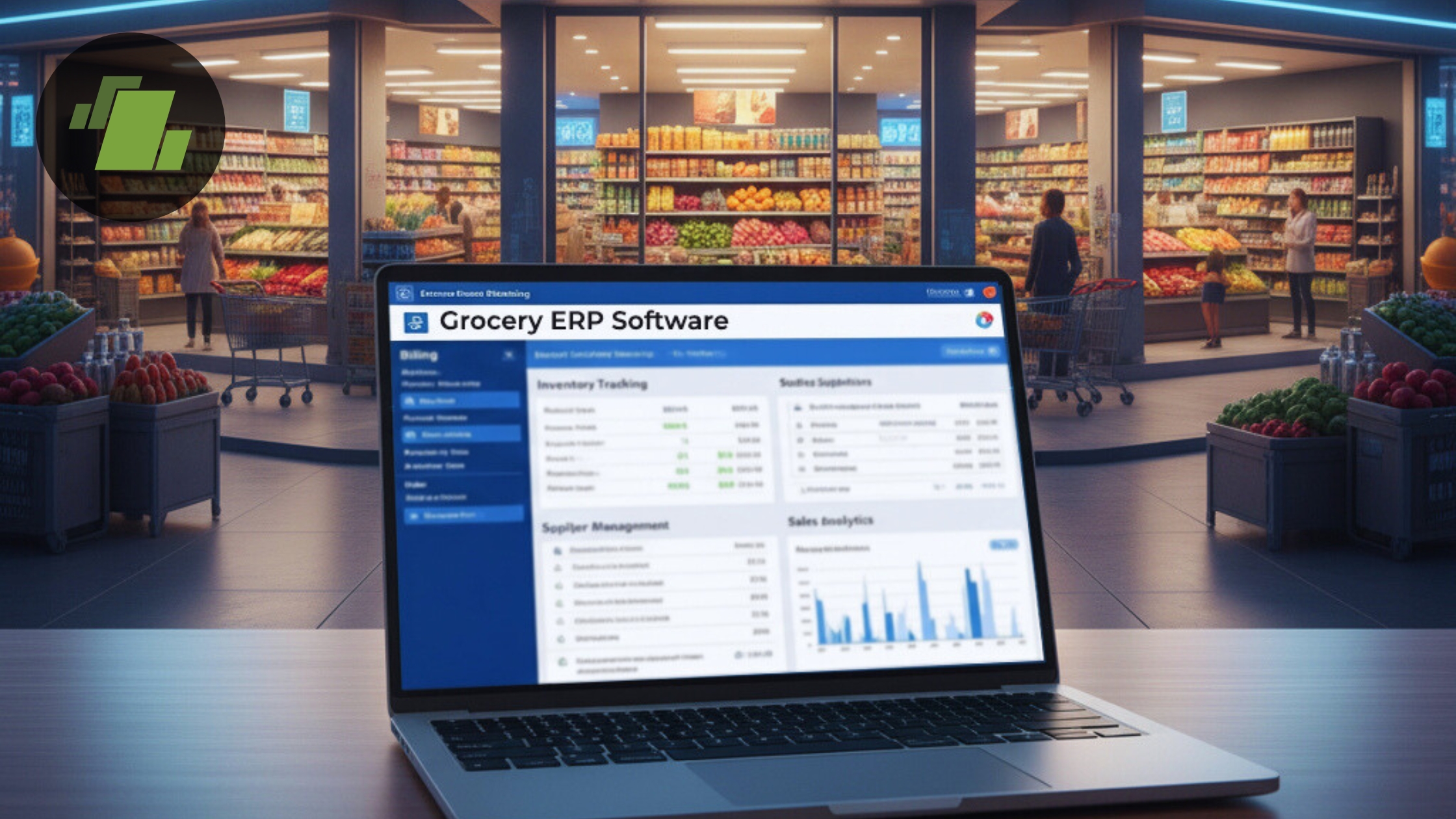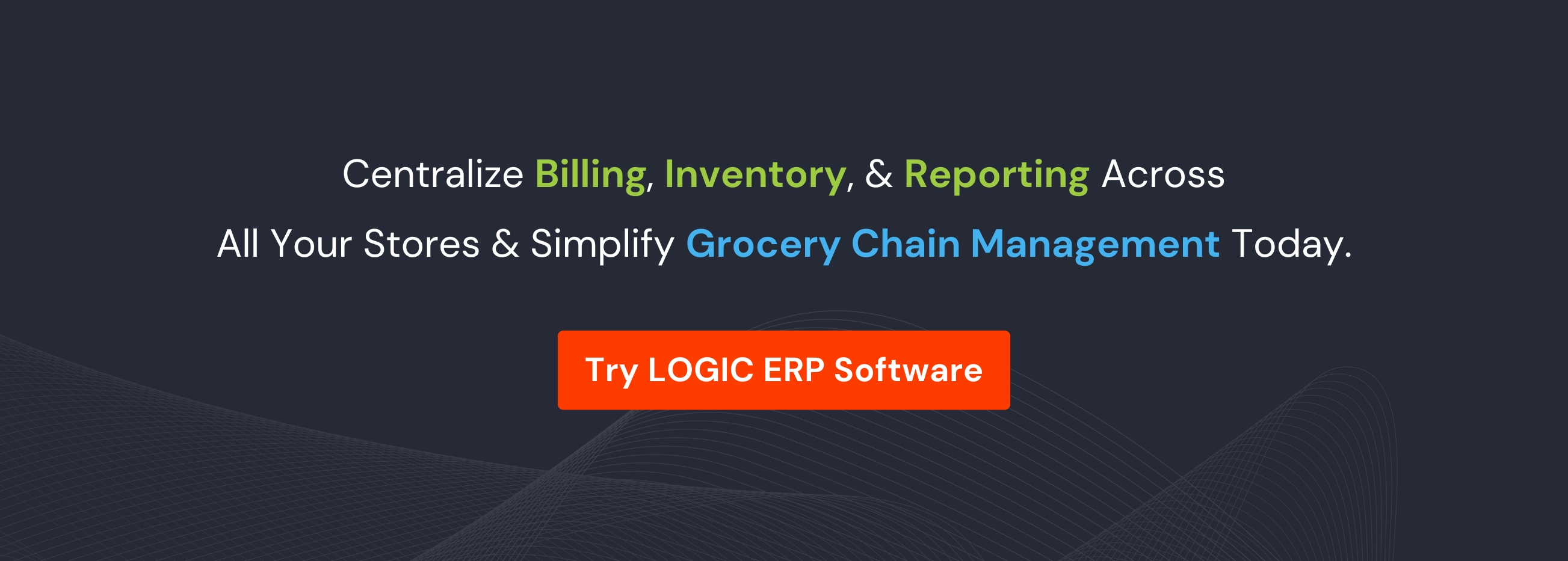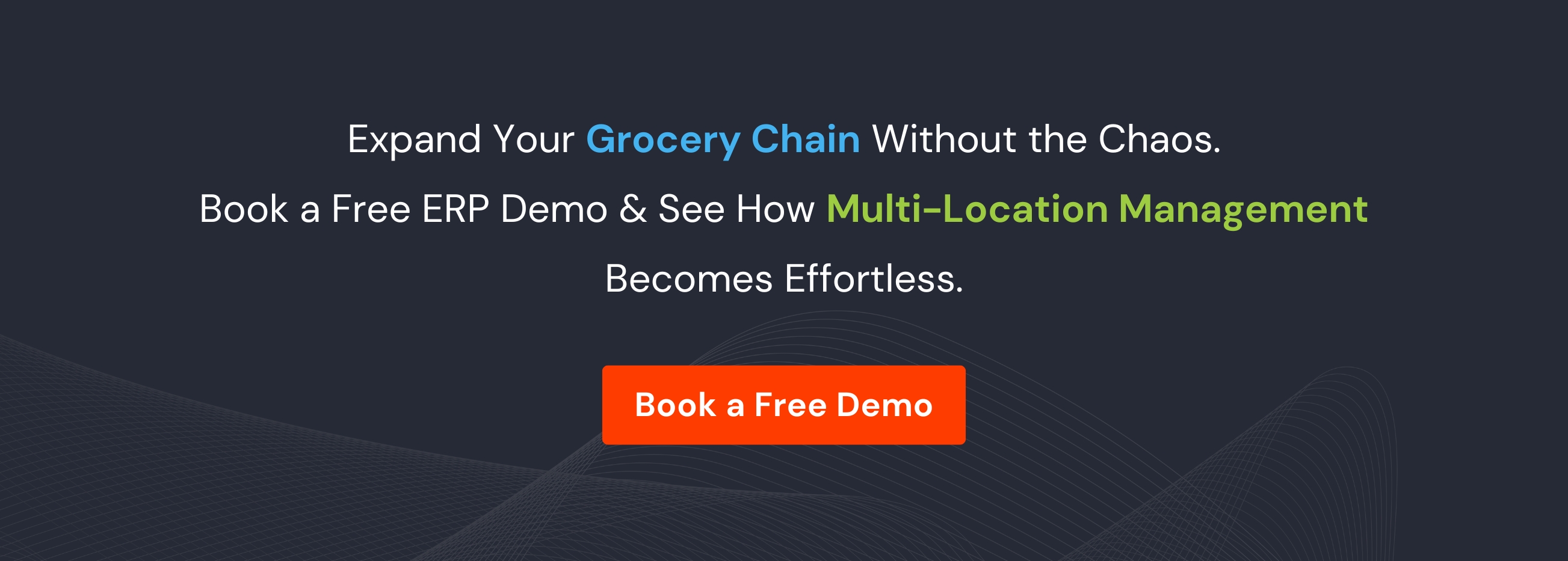Why Growing Grocery Chains Need ERP Software for Multi-Location Management


Summary
Expanding a grocery chain across multiple locations is exciting but also comes with challenges like inventory mismatches, inconsistent billing, supplier management, and compliance issues. Grocery ERP software provides a centralized solution to handle these complexities, offering real-time inventory tracking, seamless POS integration, GST-compliant billing, and multi-store analytics.
With LOGIC ERP, grocery retailers get an advanced platform to streamline retail chains, ensuring operational efficiency, better customer experience, and scalability for future growth.
Key Takeaways
- Multi-location grocery chains face challenges with inventory, pricing, billing, and compliance.
- Grocery ERP software centralizes operations across all outlets and warehouses.
- Gorcery ERP integrates sales, stock, supply chain, and accounting.
- LOGIC ERP empowers grocery retailers with features like centralized inventory, GST-ready billing, customer loyalty programs, and real-time analytics.
- ERP solutions prepare grocery businesses for scalable growth and future trends like AI-driven demand forecasting and omnichannel retailing.
Introduction
Running a single grocery store is no easy task. From ensuring the right stock is available to managing billing, staff, and customers, it takes effort and precision. Now, multiply this by five, ten, or twenty stores across different locations, and the complexity grows exponentially.
This is the exact challenge grocery retailers face when they expand into a chain business. While expansion brings growth, it also brings new hurdles: keeping inventory aligned, ensuring billing consistency, managing suppliers, and maintaining customer loyalty across all outlets.
At this stage, growing grocery chains need a more powerful, centralized solution, Grocery ERP Software with billing and POS solution.
In this article, we’ll explore why ERP is important for multi-location grocery chains, the key features it offers, real-world challenges it solves, and how LOGIC ERP is helping grocery businesses in India and beyond run their operations seamlessly.
The Challenges of Running a Multi-Location Grocery Chain
Expanding from one grocery store to multiple outlets may sound like a dream come true, but it brings its share of operational challenges. Let’s break down the biggest challenges:
1. Inventory Chaos
Imagine one store running out of cooking oil while another has an excess. Without visibility, retailers either overstock or understock, leading to losses and dissatisfied customers.
2. Price Inconsistency
A customer buys rice at one branch but finds a different price at another outlet. This inconsistency harms brand trust and creates billing disputes.
3. Manual Billing Errors
Relying solely on standalone billing systems often results in human mistakes, long queues, and inaccurate invoices.
4. Supplier & Purchase Management
With multiple stores, managing vendors, purchase orders, and payments becomes messy. Manual tracking leads to delays and higher costs.
5. Disconnected Data
Each store operating independently creates data silos. Owners struggle to get a clear view of sales, expenses, and profits across locations.
6. Customer Loyalty Gaps
Shoppers today expect consistency. If loyalty points earned at one branch can’t be redeemed at another, customers lose interest.
7. Compliance Burdens
Managing GST invoices and audits across multiple outlets without automation is both time-consuming and risky.
All these challenges directly impact profitability, efficiency, and customer satisfaction. That’s why growing grocery retailers are turning to ERP solutions.
What is Grocery ERP Software?
ERP (Enterprise Resource Planning) software for grocery stores is a comprehensive solution that brings together every important aspect of business operations: billing, POS, inventory, accounting, supply chain, CRM, and analytics, into a single integrated system.
Grocery store ERP software with billing and POS ensures that every store, warehouse, and department works in sync. Acting like the CNS of your grocery chain, grocery billing software connects that data to stock levels, supplier records, and financial accounts in real time.
Why Growing Grocery Chains Need ERP Software
Let’s explore the benefits of ERP for multi-location grocery stores:
1. Centralized Inventory Management
- Track stock across all outlets and warehouses in real time.
- Set auto-replenishment alerts to prevent stockouts.
- Minimize wastage by monitoring expiry dates for perishable goods.
Example: If your Delhi outlet is running low on flour but your Gurgaon warehouse has extra, grocery ERP system automatically suggests transferring stock instead of making a fresh purchase.
2. Uniform Pricing & Billing
- Maintain consistent product pricing across all stores.
- Apply discounts and promotions centrally so they reflect everywhere.
- Generate GST-compliant invoices instantly.
Customers trust your brand more when prices remain the same across branches.
3. Faster Checkouts with POS Integration
- ERP integrates with grocery POS software for smooth billing.
- Accept multiple payment modes (cash, UPI, cards, wallets).
- Reduce wait times at checkout counters.
Shorter queues equal happier customers and more repeat visits.
4. Vendor & Purchase Management
- Track multiple suppliers from one dashboard.
- Automate purchase orders based on stock levels.
- Negotiate better deals with supplier performance data.
5. Multi-Location Reporting & Analytics
- Compare sales performance across different outlets.
- Identify top-selling products in each region.
- Get daily, weekly, and monthly reports on revenue and profitability.
Example: If a particular product sells well in Mumbai but not in Pune, ERP insights help you plan stock accordingly.
6. Improved Customer Loyalty
- Centralized loyalty programs that work across all branches.
- Personalized offers based on customer purchase history.
- Track customer feedback and preferences.
7. GST & Compliance Automation
- Auto-generate GST-compliant invoices.
- Maintain audit-ready records for all outlets.
- Simplify tax filing with consolidated reports.
8. Scalability & Future Readiness
- Easily add new outlets to the system as your business grows.
- Manage both offline stores and online grocery sales on the same platform.
- Stay future-ready with AI-driven demand forecasting.
Key Features of Grocery ERP Software for Chains
When choosing the right solution, retailers should look for features that truly solve multi-store challenges. Here’s what matters most:
- Multi-Store Integration – One system for all branches.
- POS & Billing Software – Quick, accurate, and GST-ready.
- Centralized Inventory Control – Stock visibility across all outlets.
- Supply Chain Automation – Vendor, purchase, and logistics management.
- Loyalty & Promotions – Points, discounts, and campaigns.
- Financial Accounting – End-to-end accounting integration.
- Mobile ERP Access – Manage operations anytime, anywhere.
- Real-Time Reports – Actionable insights for decision-making.
- Cloud-Based Flexibility – Secure and accessible from anywhere.
How LOGIC ERP Helps Grocery Chains Scale Seamlessly
LOGIC ERP stands out as a trusted partner for grocery retailers across India. With decades of experience in retail and distribution management, LOGIC ERP offers industry-specific features designed for the unique needs of grocery businesses.
LOGIC ERP Advantages:
- Centralized Inventory & Stock Control – Avoid wastage and ensure product availability.
- Integrated POS Software – Fast, error-free billing with digital payments.
- GST-Ready Billing Software – Stay compliant without extra effort.
- Multi-Store Management – Manage outlets, warehouses, and supply chains from one system.
- Omnichannel Retail – Connect offline stores with online grocery platforms.
- Customizable Solutions – Adapt to the scale and workflow of your business.
- Business Insights & Analytics – Access real-time reports and forecasts.
With LOGIC ERP, retailers can:
- Eliminate manual errors.
- Reduce operational costs.
- Improve staff productivity.
- Deliver a seamless customer experience.
- Expand confidently into new regions.
Future of Grocery Retail with ERP
The grocery industry is evolving rapidly, and technology is leading the change. Here are some trends shaping the future of ERP in grocery retail:
- AI & Predictive Analytics – Smarter demand forecasting and reduced wastage.
- Mobile POS Devices – Billing on the shop floor for faster service.
- Cloud ERP – Flexibility and security for multi-branch operations.
- Integration with E-Commerce Platforms – Managing online orders alongside in-store sales.
- Automated Supply Chain – End-to-end vendor and logistics optimization.
Retailers who adopt ERP early gain a long-term competitive advantage over those still relying on manual processes or standalone systems.
Conclusion
Managing a growing grocery chain across multiple outlets is no small feat. The bigger you grow, the bigger the challenges, inventory mismatches, inconsistent billing, data silos, and compliance hurdles.
LOGIC ERP software for grocery chains helps to centralize operations, ensures consistency, improves customer experience, and provides the insights needed for smarter decision-making.
With its comprehensive features, customization, and proven expertise, LOGIC ERP is the perfect partner for grocery retailers looking to expand confidently. Whether you manage a few outlets or a large chain across cities, LOGIC ERP helps you streamline processes, reduce costs, and build customer loyalty.
Call at +91-73411-41176 or send us an email at sales@logicerp.com to book a free demo for grocery chain ERP software today!
Frequently Asked Questions (FAQs)
1. What is Grocery ERP Software?
Grocery ERP software is an integrated system that manages billing, POS, inventory, supply chain, accounting, and customer loyalty for grocery retailers, especially those with multiple outlets.
2. How is ERP different from Grocery POS or Billing Software?
POS and billing software handle transactions at the counter, but ERP goes beyond, connecting sales data with inventory, suppliers, finance, and customer management across all locations.
3. Why do multi-location grocery chains need ERP software?
As grocery businesses expand, managing stock, pricing, and compliance across outlets becomes complex. ERP software centralizes everything, ensuring smooth operations and scalability.
4. How does ERP improve customer experience in grocery stores?
ERP integrates with grocery POS software to speed up billing, enable multi-store loyalty programs, and ensure consistent pricing, leading to happier, more loyal customers.
5. Is LOGIC ERP suitable for small grocery stores too?
Yes, LOGIC ERP is customizable. It’s scalable enough for large chains but also flexible for single-store businesses planning to expand in the future.
6. Does ERP software help with GST compliance?
Absolutely. ERP automatically generates GST-compliant invoices, maintains audit-ready records, and simplifies tax filing for all branches.
7. Can ERP software support both offline and online grocery sales?
Yes. LOGIC ERP supports omnichannel retailing, allowing businesses to manage in-store and e-commerce sales seamlessly.
8. How do I get started with LOGIC ERP?
You can request a free demo, where LOGIC ERP experts showcase how the software can be customized for your grocery business and help you implement it smoothly.




